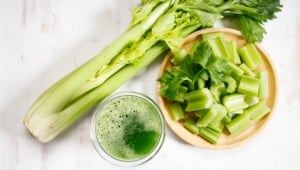6 Health Benefits of Sauerkraut & 4 Recipe Ideas

Sauerkraut is a well-known German delicacy, but did you know it was really invented in China over 2000 years ago? Here you’ll learn everything you need to know about the health benefits of Sauerkraut. You’ll also find delicious recipe ideas.
Did you know that Sauerkraut is renowned for being healthy and nutritious? It’s filled with probiotics, vitamins, and is known to boost your immune system, kickstart your digestion, and reduce your risks of developing certain illnesses.
Besides, if you’ve found yourself avoiding tangy Sauerkraut until now, you’ll find you’ve probably never had the right kind before.
In this article, we’ll share the best recipe tips for Sauerkraut (including the Chinese version), as well as some of its amazing benefits.
Interesting Facts about Sauerkraut

Interesting Facts about Sauerkraut
Sauerkraut was first created in ancient China, where cabbage was pickled in rice wine rather than salt.
Both types of pickled cabbage are delicious and offer a variety of health benefits, especially when it comes to your immune system and your gut.
Americans eat on average more than 380 million pounds of Sauerkraut per year. As a country, that’s more than Germans, who consume about 216 million pounds per year.
Interestingly, if you’re making your own Sauerkraut, you may find that it won’t ferment below 60F. As with any fermented foods (think kombucha or kimchi), making Sauerkraut is a fairly exact science.
Sauerkraut means ‘sour cabbage’ when translated from German — which makes sense, since Sauerkraut does have a tangy, salt taste.
Famous seafarer and explorer Captain Cook took Sauerkraut on his voyages to prevent scurvy. Sauerkraut is naturally rich in vitamin C, which is the most important component for both the treatment and prevention of scurvy.
What Sauerkraut Is

What Sauerkraut Is
Sauerkraut is cabbage which has been pickled using salt and spices, and left to ferment. Ideally, you’d leave Sauerkraut to ferment for 3 to 4 weeks at around 70 to 75F before tasting it, though it can take longer if kept in cooler temperatures.
Popular spices in Sauerkraut include juniper berries, bay leaves, ginger, dill, caraway seed, fennel, and lemon peel, or any combination of these.
Interestingly, some German recipes also list cloves, peppercorns, lard, allspice, onions, sugar, and, sometimes, bacon.
Asian recipe varieties tend to include rice vinegar instead of the salt, as well as garlic, chillies, sugar, and soy sauce. It’s worth experimenting with different flavors to find what you like best, especially if you’re making your own Sauerkraut.
Origin and Where Sauerkraut Comes From

Origin and Where Sauerkraut Comes From
Sauerkraut, in the sense of pickled, fermented cabbage, is originally from China. There, it was invented over 2000 years ago, and made with rice wine. The German Sauerkraut most people know and love today isn’t as old, and was likely consumed for its digestive benefits.
Ingredients in Sauerkraut

Ingredients in Sauerkraut
The ingredients in Sauerkraut can vary greatly, depending on which recipe you choose to follow.
A very basic Sauerkraut recipe should include cabbage, salt, juniper berries, bay leaves, and caraway seeds. Some also add sugar or even apple slices for some added sweetness.
Some recipes also add a variety of other vegetables. For example, adding beets can turn your Sauerkraut a beautiful pinkish red color.
The general rule for adding other veggies appears to be that you should stick to 75 percent cabbage and 25 percent other stuff that flavors the cabbage. Besides beetroot, apples, carrots, parsnips, and onions all make great additions.
Beware that sugary fruits and vegetables and even sugar itself will encourage a yeasty fermentation process.
This can make your finished brine slightly slimy or even turn it a little bit alcoholic. If you want to avoid this, don’t add sugary foods or actual sugar to your Sauerkraut.
Nutritional Facts, Calories and Protein of Sauerkraut

Nutritional Facts, Calories and Protein of Sauerkraut
Sauerkraut is full of nutrients, including helpful vitamins and minerals.
It includes plenty of vitamin A, vitamin B, vitamin C, vitamin K1, vitamin K2, calcium, potassium, manganese, iron, folate, and copper. It’s also full of fiber, protein, and helpful amino acids, and a potent source of antioxidants.
A cup of Sauerkraut will contain around 27 calories. With that said, if it’s made with lard and/or bacon, as per some of the German recipes, it will contain a lot more calories. Depending on your recipe, it may also contain quite a lot of salt.
Health Benefits of Eating Sauerkraut: Why It Is So Good for You

Health Benefits of Eating Sauerkraut: Why It Is So Good for You
Sauerkraut is full of beneficial nutrients that make it a great addition to just about anybody’s diet. It’s well-tolerated and doesn’t have many side effects, unless it’s prepared badly. In short, Sauerkraut is a real modern-day superfood with ancient roots. Here is why you should give it a try.
Can Boost Your Immune System

Can Boost Your Immune System
Whether you buy it from the shop or make it at home, unpasteurized Sauerkraut is filled with helpful probiotics. These help populate your digestive system with beneficial bacteria.
The probiotics in Sauerkraut can help balance the bacteria in your digestive system, which in turn has huge effects on your overall health.
Good gut health is linked to a number of benefits, including lower risk of developing certain ailments, allergies, and even mental health. A healthy digestive system will also allow your body to absorb nutrients much more effectively — a true win-win.
May Reduce Your Risk of Developing Some Illnesses

May Reduce Your Risk of Developing Some Illnesses
If you regularly enjoy Sauerkraut or other fermented, probiotic-rich foods, you may actually reduce your risks of developing certain ailments.
Probiotics can effectively prevent urinary tract infections, the common cold, and more. The vitamin C and iron in Sauerkraut can also help you feel better much faster if you do get sick.
The probiotics in Sauerkraut can re-balance the bacteria in your gut after illness or certain medications, such as antibiotics. Interestingly, Sauerkraut may also reduce your risk of developing certain cancers.
This is due to the antioxidants found in cabbage and compounds developed during fermentation.
Can Help Improve Your Digestion

Can Help Improve Your Digestion
Sauerkraut contains plenty of fiber, which is one of the most helpful aids for proper digestion. Fiber can increase the volume of your stools, as well as softening it, so it’s easier to go to the toilet.
Sauerkraut also has enzymes created by the fermentation process, which help your body break down food more easily, allowing it to absorb a larger volume of nutrients.
May Aid in Weight Loss

May Aid in Weight Loss
Enjoying Sauerkraut as a regular part of your diet may help with weight loss. This is because most Sauerkraut, depending on your recipe, contains very few calories while also having a high fiber content.
Fiber helps keep you full for longer, so you may be able to reduce the remainder of your food intake naturally.
Might Support Better Heart Health

Might Support Better Heart Health
The probiotics and fiber in Sauerkraut may help boost your heart health. This is because both probiotics and fiber are helpful for reducing levels of bad cholesterol in your body.
Probiotics are also helpful for lowering blood pressure in people struggling with hypertension.
Could Improve and Balance Moods
Sauerkraut helps improve your digestive system and balances out bacteria in your gut. This allows your digestive lining to better absorb nutrients, including minerals which may help regulate your moods. This may help boost your brain’s health and reduce feelings of stress.
Potential Risks of Sauerkraut

Potential Risks of Sauerkraut
Most natural remedies have some side effects and, perhaps surprisingly, this includes Sauerkraut. Sauerkraut is a real superfood, but it poses some small risks, mostly associated with poor preparation or excess consumption. Here is a list of the most common side effects.
Too Much Sodium May Increase Your Risk of Heart Disease and Stroke

Too Much Sodium May Increase Your Risk of Heart Disease and Stroke
Eating too much salt is well-known to increase your risk of high blood pressure, heart disease, and even stroke. Sauerkraut does tend to contain a lot of salt.
If you’re on a low sodium diet, but would still like to enjoy Sauerkraut, you may wish to opt for Chinese-style Sauerkraut recipes instead, as these are made with vinegar as well as salt, and appear to contain less sodium overall.
You May Not Tolerate It

You May Not Tolerate It
Compared with a variety of other foods commonly enjoyed, Sauerkraut contains quite a lot of histamine. People who are particularly sensitive to histamine with regards to allergic reactions may wish to steer clear of Sauerkraut.
Fermented Foods May Cause Flatulence or Bloating
If you’re new to adding fermented food to your diet, Sauerkraut may give you some unwanted side effects. It could cause some bloating and flatulence.
Fortunately, these symptoms should subside once you have Sauerkraut a little more frequently. They’re merely signs of your digestive system getting used to the new foods.
People with Kidney Disease May Need to Exercise Caution

People with Kidney Disease May Need to Exercise Caution
Consuming too much salt is linked to increased protein in your urine. This is one of the most common risk factors when it comes to declining function of your kidneys and kidney disease.
If you already suffer from kidney disease, excess salt may also make your kidneys deteriorate faster than they would on a more balanced diet.
If you do wish to add Sauerkraut to your diet, pick an option with limited salt.
Is Sauerkraut in Pregnancy Good For You?

Is Sauerkraut in Pregnancy Good For You?
Sauerkraut makes for an excellent addition to your pregnancy diet. It’s rich in helpful nutrients, including folate and iron.
If you suffer from pregnancy-related anemia, iron is a must, while folate is known to help reduce your risk of going into labor prematurely, and of your baby developing birth defects or being born with a low birth weight.
Folate is particularly important when it comes to preventing neural tube, brain, and spinal defects.
Make sure you buy your Sauerkraut from a reputable source or follow exact hygiene standards if you make it at home, and you’ll reap plenty of health benefits for both yourself and your baby or babies.
Bonus: if you find pregnancy affecting your moods, you’ll love that Sauerkraut can help there, too. Some research suggests that Sauerkraut and other fermented foods could improve your moods by boosting the way your digestive system absorbs minerals such as zinc and magnesium.
Can Dogs and Cats Eat Sauerkraut?

Can Dogs and Cats Eat Sauerkraut?
Sauerkraut itself is actually very healthy for your furry friends. Just be mindful of any store bought varieties which may contain caraway seeds or large quantities of salt, both of which could harm your dog.
Cats don’t actually need to have vegetables in their diet, so they won’t really benefit from having Sauerkraut or other fermented veggies.
Dogs may benefit from the vitamins, minerals, and fiber in Sauerkraut. Anecdotally, Sauerkraut is also quite helpful if your dog has eaten something ‘off’, as it can aid digestion.
In other words, Sauerkraut may help your dog rid himself of something faster and more effectively than other food.
Delicious Recipe Ideas with Sauerkraut

Delicious Recipe Ideas with Sauerkraut
Sauerkraut is great on its own, but even better as a side dish or main ingredient in a larger meal. Here are some of our favorite ways to enjoy Sauerkraut, and how you can easily make them at home.
Enjoy Some Traditional German Pork with Sauerkraut

Enjoy Some Traditional German Pork with Sauerkraut
Arguably the very best way to enjoy Sauerkraut is to have it with a traditional German pork roast, apples, potatoes, and caraway seeds. A pork roast is best when made with some delicious, salty crackling.
The apples and potatoes effectively absorb some of the grease and saltiness, making this a wonderful comfort food.
Make a Healthy Sauerkraut Soup

Make a Healthy Sauerkraut Soup
Sauerkraut soup is popular in Poland and the Ukraine. It’s made with Sauerkraut, bacon, celery, carrots, potatoes, white beans, some olive oil, and bay leaves. The bacon adds tons of flavor, while the other ingredients make this quite a healthy, warming soup.
Try Chinese Fermented Cabbage for Comparison

Try Chinese Fermented Cabbage for Comparison
A lot of the fermented cabbage or Sauerkraut-style recipes from China contain less salt. This is because rice vinegar is added as part of the process.
One of the best recipes we came across mixed cabbage with carrot, a small amount of salt, some sugar, chili, rice vinegar, and water.
You’ll get a spicier, slightly sweet and sour pickle as a result, which is no less nutritious. Helpful if you can’t take too much salt in your diet.
Have a Classic Reuben Sandwich with Sauerkraut

Have a Classic Reuben Sandwich with Sauerkraut
Reuben sandwiches are popular for their mouthwatering pastrami filling, paired with sauerkraut, cheese, and a delicious dressing.
It’s an Omaha-made classic that dates back to 1925, when it was invented by one Reuben Kulakofsky. The rest, as they say, is history.
You can make this even more delicious by making your own pastrami, complete with juice flavors and a delicious crust made of tasty spices.
Tips for Using Sauerkraut

Tips for Using Sauerkraut
If you buy Sauerkraut from a supermarket you’ll be able to just follow the package instructions, for the most part.
However, if you make your own Sauerkraut from scratch, you’ll really benefit from the tips below. There’s so much more to Sauerkraut than just fermented cabbage.
How to Store Sauerkraut

How to Store Sauerkraut
You can keep Sauerkraut that has been fully fermented in a fridge for a few months, so long as it has a tight cover on top. You may also freeze and/or can homemade Sauerkraut once it’s been fermented.
Make Your Own Sauerkraut

Make Your Own Sauerkraut
You can easily make your own Sauerkraut at home. You’ll generally need between 2 to 2.25 percent of salt per amount of cabbage.
Follow your favorite recipe and add any spices or additional vegetables you like, then ferment the Sauerkraut for around three to four weeks at 70 to 75F for best results.
Drink Sauerkraut Juice
Sauerkraut juice is a great replacement for vinegar in any recipes that may require it. It’s full of beneficial bacteria and all manner of nutrients. If you’ve ever had a sip of apple cider vinegar for its health benefits, you’ll find that drinking Sauerkraut juice is much the same, if not better.
Add Sauerkraut to Smoothies

Add Sauerkraut to Smoothies
It may sound a little strange, but adding Sauerkraut to your smoothies is a delicious and healthy idea to try at home.
Simply combine some Sauerkraut juice (or Sauerkraut itself), pineapple, peach, a bit of ginger, and some kombucha.
The beneficial bacteria in both the Sauerkraut and kombucha pair beautifully with the freshness and nutritiousness of the fruits.
- Tomato Juice. Health Benefits + Tips.
- Asparagus. Benefits for Your Health.
- Mango. Benefits and Side Effects.
- Onions. Health Benefits and Tips for Use.
- Spinach. Benefits and Exctiting Facts.
- Peanuts. Health Benefits & Tips and Hacks.
- Dark Chocolate. Health Benefits and Tips.
- Hibiscus Tea. Health Benefits and Recipe.





